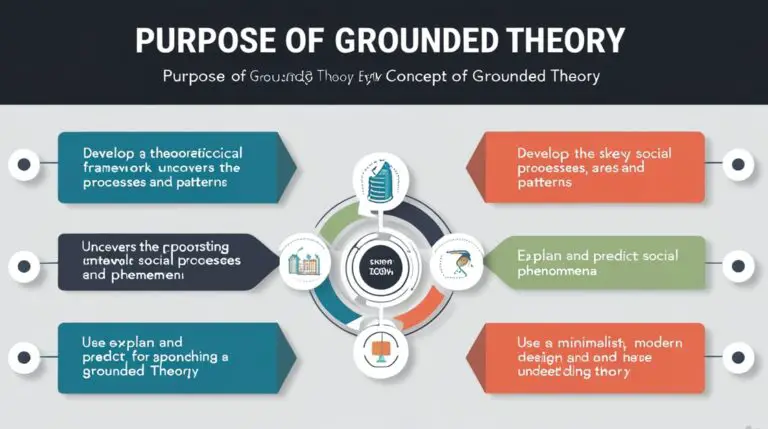Defining Grounded Theory
“Grounded theory is a qualitative research method that aims to generate theories based on data that are grounded in the empirical reality of the research context.” The method involves a systematic process of data collection, coding, categorization, and analysis to identify patterns and relationships in the data. The definitive purpose is to develop a theory that explains the phenomenon being studied, which is based on the data collected and analyzed rather than on preconceived notions or hypotheses. This approach starts with a general topic and builds theories based on the data collected through interviews, observations, etc. Researchers don’t go in with a set hypothesis but rather let the data guide them towards new understandings.
Grounded theory was first introduced by sociologists Barney Glaser and Anselm Strauss in the 1960s as a response to the limitations of traditional positivist approaches to social research. Glaser and Strauss published their seminal book “The Discovery of Grounded Theory” in 1967, in which they presented their approach to developing theory from empirical data.
Steps for Conducting Grounded Theory
Here are some general guidelines for conducting a Grounded Theory study:
Choose a Research Question
Start by selecting a research question that is open-ended and focuses on a specific social phenomenon or problem.
Select Participants and Collect Data
Identify a diverse group of participants who have experienced the phenomenon being studied. A variety of data collection methods are used, such as interviews, observations, and document analysis to collect rich and diverse data.
Analyze the Data
Begin the process of analyzing the data using constant comparison. This involves comparing the data to each other and to existing categories and codes in order to identify patterns and relationships. Use open coding to identify concepts and categories, and then use axial coding to organize them into a theoretical framework.
Generate Categories and Codes
Generate categories and codes that describe the phenomenon being studied. Make sure that they are grounded in the data and that they accurately reflect the experiences of the participants.
Refine and Develop the Theory
Use theoretical sampling to identify new data sources that are relevant to the developing theory. Use memoing (memos are insights or ideas that one has about the data) to reflect on insights and ideas that emerge during the analysis process. Continue to refine and develop the theory until it provides a comprehensive explanation of the phenomenon.
Validate the Theory
Finally, seek to validate the theory by testing it against new data and seeking feedback from peers and other researchers. This process helps to refine and improve the theory and ensure that it is grounded in the data.
Write Up and Disseminate the Findings
Once the theory is fully developed and validated, write up the findings and disseminate them through academic publications and presentations. Make sure to acknowledge the contributions of the participants and provide a detailed account of the research methods used.
Grounded Theory Data Collection Methods

Interviews
One of the most common data collection methods in Grounded Theory is in-depth interviews. Interviews allow researchers to gather rich and detailed data about participants’ experiences, perspectives, and attitudes. Interviews are usually conducted in face to face interaction or in organized groups.
Observation
Observation is another data collection method used in Grounded Theory. Researchers may observe participants in their natural settings, such as in a workplace or community setting. This method can provide insights into the social interactions and behaviors of participants.
Document Analysis
Grounded Theory researchers also use document analysis as a data collection method. This involves analyzing existing documents such as reports, policies, or historical records that are relevant to the phenomenon being studied.
Focus Groups
Focus groups involve bringing together a group of people to have discussions on a specific topic or issue. This method can provide insights into group dynamics and social interactions.
Fieldwork
Fieldwork involves immersing oneself in the research setting and participating in the activities of the participants. This approach offers an in-depth knowledge of the culture and social dynamics within the research setting.
Multimedia Data
Grounded Theory researchers may also use multimedia data such as photographs, videos, or audio recordings to capture the experiences and perspectives of participants.
Purpose of Grounded Theory

Develop a Theoretical Framework
The prime goal of Grounded Theory is to develop a theoretical framework that explains a social phenomenon, process, or interaction. This theoretical framework is developed through a rigorous process of data collection, coding, and analysis and is grounded in the data.
Uncovers the Social Processes and Patterns
Grounded Theory aims to uncover the social processes and patterns that underlie social phenomena and to develop a theoretical framework that explains these processes and patterns. The method is flexible and can be applied to investigate various research questions and contexts and is particularly well-suited to exploring complex social phenomena that have not been well-studied.
Explain and Predict Social Phenomena
The ultimate goal of Grounded Theory is to generate a theoretical framework that is grounded in the data, and that can be used to explain and predict social phenomena. This theoretical framework can then be used to inform policy and practice and to guide future research in the field.
Applicability of Grounded Theory
Following are some situations in which grounded theory may be particularly useful:
Exploring New Areas of Research
Grounded Theory is particularly useful when exploring new areas of research that have not been well-studied. By collecting and analyzing data, researchers can develop a theoretical framework that explains the social processes and patterns underlying the phenomenon of interest.
Studying Complex Social Phenomena
Grounded Theory is well-suited to exploring complex social phenomena that involve multiple social processes and interactions. By using an iterative process of data collection and analysis, researchers can develop a theoretical framework that explains the complexity of the social phenomenon.
Generating Hypotheses
Grounded Theory can be used to generate hypotheses about social processes and interactions that can be tested in future research. By developing a theoretical framework that explains a social phenomenon, researchers can identify areas for further research and hypothesis testing.
Informing Policy and Practice
Grounded Theory can provide insights into the factors that influence social phenomena and can inform policy and practice in a variety of fields. By developing a theoretical framework that explains a social phenomenon, researchers can identify areas for intervention and policy development.






